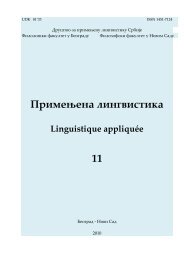Примењена лингвистика у част Ранку Бугарском - Језик у
Примењена лингвистика у част Ранку Бугарском - Језик у
Примењена лингвистика у част Ранку Бугарском - Језик у
You also want an ePaper? Increase the reach of your titles
YUMPU automatically turns print PDFs into web optimized ePapers that Google loves.
JEZIK U UPOTREBI / LANGUAGE IN USE<br />
By using the unmodified name Bahasa without a qualification, the taxi-driver<br />
was both acknowledging the commonality of the different national languages<br />
and avoiding any national specification. The situation can be compared to the<br />
use of naš jezik ‘our language’ in former Yugoslavia, to avoid the complexities<br />
of Serbo-Croatian, Croato-Serbian, Serbian, or Croatian (and now also Bosnian<br />
and Montenegrin), all of which were originally based on the dialect of Tršić in<br />
southwestern Serbia. 23<br />
3. This brings us to issues of language and identity. In the case of Malay, the<br />
colonial experience divided the language between British and Dutch spheres. In<br />
the case of South Slavic, the imperial spheres were Austro-Hungarian and Ottoman<br />
Turkish. In the British sphere Malay was both a majority language and<br />
a lingua franca, whereas in the Dutch sphere it was a lingua franca. But in both<br />
spheres, Islam was the majority religion, although Buddhism, Hinduism, Animism,<br />
and Christianity were and are also present. South Slavic territory was religiously<br />
divided among Muslims and Catholic and Orthodox Christians (as well<br />
as Jews, Armenians, etc.), and, as Greenberg (1996) has shown, these divisions<br />
had almost no effect on local dialects. Unlike the situation with, e.g., Albanian,<br />
however, where religious difference was explicitly overcome, speakers of South<br />
Slavic failed to disconnect the ideas of ethno-linguistic and religious identity –<br />
not only among Croats, Bosniacs, Serbs, etc., but also among Macedonians and<br />
Bulgarians, whose Muslim speakers do not identify (and on the popular level are<br />
not identified by their Christian neighbors) on a linguistic basis (although Goran,<br />
Torbeš, and Pomak identities do combine language and religion). 24<br />
23 In both sets of standards, i.e. Bahasa and those arising from the former Serbo-Croatian, the<br />
choice of dialect base had specific, albeit contrasting, historical reasons connected with factors such<br />
as prestige (overt for Malaysia and Indonesia [McGinn 1991], covert for Vuk’s language), relative<br />
numbers of speakers (majorities in Malaysia and Yugoslavia) and geographic extent – a criterion for<br />
Indonesia together with the fact that in 1928 Malay was native for only 5% of the population (as opposed<br />
to 40% for Javanese), which meant that it was a widespread lingua franca without overtones<br />
of ethnic dominance (McGinn 1991, Sneddon 2003). That not everyone in former Yugoslavia took<br />
the efforts of centrifugalist standardizers seriously can be seen in two episodes of the Yugoslav television<br />
show Top Lista Nadrealista (Surrealists’ Top List), still available on YouTube. They provide<br />
particularly biting satire of the linguistic break-up. The first is Prevodioc ‘The Translator’ http://<br />
www.youtube.com/watch?v=3kkStbK5mCs (accessed 20 January 2011) and Otvoreno o jeziku<br />
‘Openly About Language’ http://www.youtube.com/watch?v=V6Ia15riHRw&feature=related (accessed<br />
20 January 2011). The second episode discusses six languages: srpski, hrvatski, bosanski,<br />
hercegovački, crnski, i gorski ‘Serbian, Croatian, Bosnian, Hercegovinian, Monten, and Negrin.’<br />
24 Collins (2011) has interesting examples from Maluku and Kalimantan in Indonesia of how religious<br />
affiliation can have different effects on language loyalty in different linguistic environments<br />
(ecologies). In Maluku, Christians have shifted to Malay while the preservation of indigenous<br />
languages is more likely among Muslims. In Kalimantan Barat, the westernmost province on the<br />
Indonesian part of the island of Borneo, it is the Muslim population that has shifted to Malay and<br />
63




